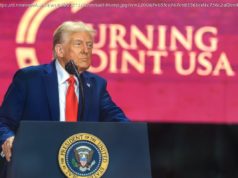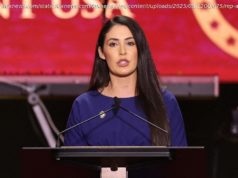President Donald Trump claimed in an interview with Axios released Tuesday that he could end birthright citizenship with an executive order. “It was always told…
President Donald Trump claimed in an interview with Axios released Tuesday that he could end birthright citizenship with an executive order.
“It was always told to me that you needed a constitutional amendment. Guess what? You don’t,” said Trump. “You can definitely do it with an act of Congress. But now they’re saying I can do it just with an executive order.”
Some people took to Twitter to disagree, suggesting that such a move would be unconstitutional.
Not only is the @realdonaldtrump ‘s birthright citizenship EO unconstitutional, but it is a distraction from issues like preexisting conditions. Republicans tried time and again to take away millions of Americans’ healthcare & this is a smokescreen to hide from that record!
— Rep. Nydia Velazquez (@NydiaVelazquez) October 30,2018
“Not only is the @realDonaldTrump’s birthright citizenship EO unconstitutional, but it is a distraction from issues like preexisting conditions,” said Democratic Rep. Nydia Velazquez in a tweet.
Trump’s unconstitutional birthright citizenship Exec. Order is a good occasion to remind us of something Ive been thinking about lots. In an age where there is so much incivility, the Constitution brings us together. There are values there that transcend the crassness of the moment
— Neal Katyal (@neal_katyal) October 30,2018
“Trump’s unconstitutional birthright citizenship Exec. Order is a good occasion to remind us of something Ive been thinking about lots. In an age where there is so much incivility, the Constitution brings us together,” tweeted Neal Katyal, who served as acting solicitor general under former President Barack Obama.
Trump’s plan to end birthright citizenship via executive order is flatly unconstitutional. If a child is born on U. S. soil, and that child’s parents don’t happen to be diplomats, foreign ministers, or invading foreign troops, then that child is a U. S. citizen by virtue of birth.
— Damon Root (@damonroot) October 30,2018
“Trump’s plan to end birthright citizenship via executive order is flatly unconstitutional,” said Damon Root of Reason magazine.
Verdict: Unsubstantiated
While most legal experts agree the president cannot undo birthright citizenship with an executive order, others believe it may be possible.
Fact Check:
Birthright citizenship refers to a grant of citizenship to children born within the territory of a given nation. While about 30 nations around the world have birthright citizenship, Canada and the U. S. are the only “developed” countries which offer it automatically.
The idea of birthright citizenship was incorporated into the U. S. Constitution through the ratification of the 14th Amendment in 1868 following the conclusion of the Civil War. The amendment was originally intended to overturn an earlier Supreme Court decision which prevented the descendants of slaves from becoming citizens. The first clause of Section One, also known as the Citizenship Clause, reads as follows:
“All persons born or naturalized in the United States, and subject to the jurisdiction thereof, are citizens of the United States and of the State wherein they reside.”
Trump has been critical of birthright citizenship and made ending it one of his campaign promises back in 2015, arguing that it “remains the biggest magnet for illegal immigration.” Several other top Republicans, including Secretary of Housing and Urban Development Ben Carson, Sen. Lindsey Graham and Sen. Rand Paul, have also come out against it.
Most legal experts argue that Trump cannot simply end birthright citizenship. Any changes, they say, would require a constitutional amendment, or perhaps an act of Congress.
“President Trump cannot end birthright citizenship because the Constitution guarantees citizenship to everyone born in the United States who are subject to its jurisdiction – that is, subject to its laws. The only people who fall outside this description are foreign diplomats who are not subject to its laws,” David Bier, an immigration policy analyst at the libertarian Cato Institute, told The Daily Caller News Foundation in an email.
Constitutional lawyer Floyd Abrams agreed that an attempt to end birthright citizenship would likely be unconstitutional and a violation the 14th Amendment.
“The notion that any child born in this country may be denied American citizenship seems to me inconsistent with the language and plain reading of the Fourteenth Amendment. That it is also inconsistent with the way the Amendment has been understood through the years makes it even less likely that such a constricted view of it would be adopted,” said Abrams in an email to TheDCNF.
Professor Robert Hume, chair of the political science department at Fordham University, agreed with Abrams’ conclusion. “For Trump to prevail, he would somehow have to get around the plain meaning of the text, the original understanding, and a long history of interpretation, which all point against the president’s position,” he said in an email to TheDCNF.
Others say that the “jurisdiction thereof” stipulation of the 14th Amendment excludes children born in the U. S. to illegal immigrants.
John Eastman, a professor of constitutional law at Chapman University, argues that since illegal immigrants are not subject to the “ complete ” jurisdiction of the U. S. (they cannot be prosecuted for treason, for example), their children do not qualify under the Citizenship Clause.
“The constitution has two requirements – birth on U. S. soil, and being subject to the jurisdiction of the U. S. I contend (with solid historical evidence) that the latter meant complete jurisdiction, not merely partial or territorial. The Immigration Act of Congress merely mirrors the constitution’s language, so it means the same thing. So I do think the President can issue an executive order directing executive agencies to adopt and enforce the correct understanding of the Constitution,” said Eastman in an email to TheDCNF.
Trump himself has embraced this view. “I don’t think they have American citizenship, and if you speak to some very, very good lawyers – and I know some will disagree, but many of them agree with me – and you’re going to find they do not have American citizenship,” said Trump while discussing the issue on Fox News back in 2015.
Домой
United States
USA — Political FACT CHECK: Can Trump End Birthright Citizenship With An Executive Order?






